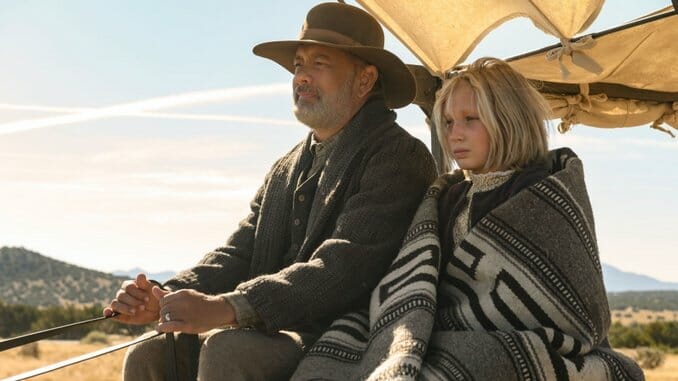News of the World‘s Handsome, Old-Fashioned Western Is Premium Late-Career Tom Hanks
Photos Courtesy of Universal
Imagine living in an era when news was a precious commodity and people didn’t walk around with an information IV drip glued to their hands. Imagine “news” being a narrative: A story told as one might tell folk and fairy tales. Now imagine a hangdog Tom Hanks wandering from town to town in post-Civil War Texas, reading the paper to a paying audience hungry for word from the world beyond their town limits. When broadcasts about the country’s well-being are scarce, folks tend to become desperate for even the most barebones reporting, though not so desperate that they accept those reports, delivered from an impartial source, as fact. In short, the more things change, the more they stay the same.
Paul Greengrass and screenwriting partner Luke Davies may have adapted Paulette Jiles’ 2016 Western novel News of the World at least in partial consideration of how far the United States hasn’t come as a nation—around the time of the book’s publication, such cursed phrases as “fake news” and “alternative facts” were inducted into popular language by fascists and crooks attempting to pull a fast one on the American people. Neither of these terms, nor their equally grotesque cousins, make their way into Greengrass’ film, but the spirit that conjured them into being four years ago is alive and well in his recreation of the American frontier.
His hero is Captain Jefferson Kyle Kidd (Hanks), a Confederate Civil War veteran who, having stood on the losing side of history, moseys across the Lone Star State and reads out-of-town papers to the locals at each stop on his journeys. The movie doesn’t exactly ask the viewer to overlook which side of the war Kidd stood on: In fact, the truth of his old allegiances becomes more unavoidable the less directly they’re spoken of. This is Texas. An erstwhile soldier in Texas could only have fought on one side of the aisle. News of the World damns Kidd without having to say a word. But as soon as the film judges him, it presents him with a chance at redemption in the form of a girl, Johanna (Helena Zengel), whom he discovers by a ransacked caravan and the corpse of the Black freeman who drove it.
Kidd’s decency kicks in immediately. He assumes responsibility for the girl, who speaks only Kiowa and acts downright feral, and carries her as far as he thinks he must until it becomes clear nobody gives a damn about child welfare in the postwar South. If Johanna is to be returned safely to her only living relatives—an aunt and uncle living in Castroville—Kidd must be the one to do it. So he wrangles Johanna and takes her along on his travels, fending off dangers ranging from the elements to the scourge of man as the two slowly bond. Saving her life from child trafficking shitkickers helps. Learning how to communicate with each other almost helps even more: Kidd and Johanna take turns teaching one another words in their respective languages, including their names, and once they have words in common, everything else falls into place, except for smooth sailing toward their destination.
-

-

-

-

-

-

-

-

-

-

-

-

-

-

-

-

-

-

-

-

-

-

-

-

-

-

-

-

-

-

-

-

-

-

-

-

-

-

-

-








































